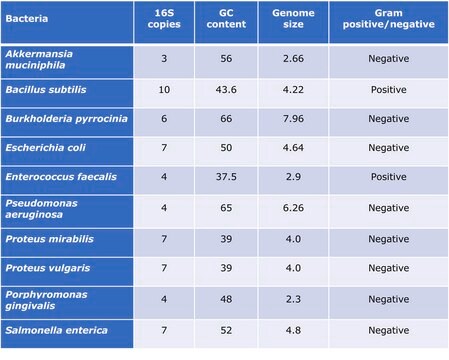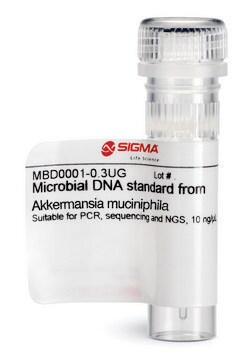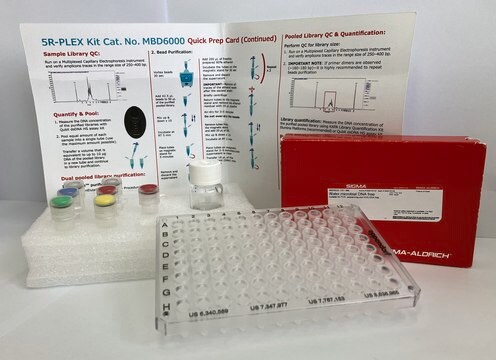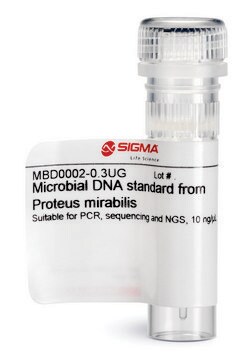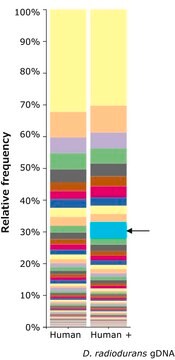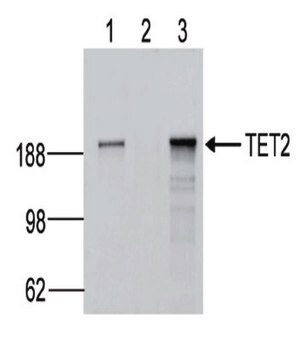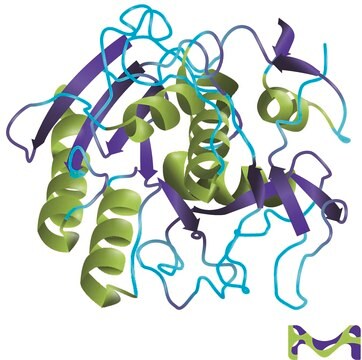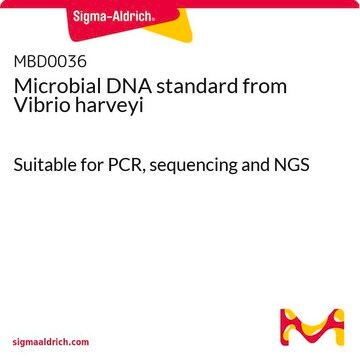MBD0003
Microbial DNA standard from Proteus vulgaris
Suitable for PCR, sequencing and NGS
Iniciar sesiónpara Ver la Fijación de precios por contrato y de la organización
About This Item
Código UNSPSC:
12352200
NACRES:
NA.24
Productos recomendados
Nivel de calidad
Formulario
liquid
concentración
10 ng/μL
técnicas
DNA extraction: suitable
DNA sequencing: suitable
PCR: suitable
Condiciones de envío
ambient
temp. de almacenamiento
−20°C
Descripción general
Standardization of sample analysis is currently needed in microbiome genomics research workflow. Lack of standardization can lead to biases and errors in common processes during sample preparation and analysis such as sample amplification, sequencing and bioinformatics analyses.1 Proteus vulgaris genomic DNA microbial standard can serve as standard for benchmarking the performance along the workflow of microbiomics or meta-genomics analyses and as a tool to increase reproducibility and allow comparison of results obtained by different labs.
Proteus vulgaris is a rod-shaped gram negative, facultative anaerobe bacterium. It inhabits the intestinal tract of humans and animals and can be found in soil, water and feces.2 P. vulgaris is a member of Enterobacteriacea family that are opportunistic pathogens in humans, responsible for urinary tract and burn infections. 3 P. vulgaris was also observed fecal samples of healthy individuals. 4Read here how to use our standards to ensure data integrity for your microbiome research.
Aplicación
Suitable for Quantitative standard for PCR, Sequencing and NGS
Características y beneficios
- Individual microbial standard for microbiomics and meta-genomics workflow
- Suitable standard for PCR, sequencing and NGS
- Improve Bioinformatics analyses
- Increases reproducibility
- Compare results lab to lab
Forma física
Liquid -The genomic DNA is provided at ≥10 ng/μl concentration in TE buffer pH 8.0
Código de clase de almacenamiento
12 - Non Combustible Liquids
Clase de riesgo para el agua (WGK)
WGK 1
Punto de inflamabilidad (°F)
Not applicable
Punto de inflamabilidad (°C)
Not applicable
Elija entre una de las versiones más recientes:
Certificados de análisis (COA)
Lot/Batch Number
¿No ve la versión correcta?
Si necesita una versión concreta, puede buscar un certificado específico por el número de lote.
¿Ya tiene este producto?
Encuentre la documentación para los productos que ha comprado recientemente en la Biblioteca de documentos.
Proteus vulgaris urinary tract infections in rats; treatment with nitrofuran derivatives
D. J. N. Hossack
British Journal of Pharmacology and Chemotherapy, 306-312 (1962)
Nerea Porres-Osante et al.
Microbial ecology, 70(1), 132-140 (2014-12-17)
The intestinal tract is a huge reservoir of Enterobacteriaceae, some of which are opportunist pathogens. Several genera of these bacteria harbour intrinsic antibiotic resistance genes, such as ampC genes in species of Citrobacter, Enterobacter or Escherichia genera. In this work
D C Morrison et al.
Annual review of medicine, 38, 417-432 (1987-01-01)
In this chapter, current concepts about the mechanisms of action of endotoxin are reviewed. Particular attention is focused upon endotoxin-induced production of soluble mediators from macrophages and mononuclear cells and on the potential contribution of these mediators to endotoxin shock.
J Paul Brooks et al.
BMC microbiology, 15, 66-66 (2015-04-17)
Characterizing microbial communities via next-generation sequencing is subject to a number of pitfalls involving sample processing. The observed community composition can be a severe distortion of the quantities of bacteria actually present in the microbiome, hampering analysis and threatening the
Nuestro equipo de científicos tiene experiencia en todas las áreas de investigación: Ciencias de la vida, Ciencia de los materiales, Síntesis química, Cromatografía, Analítica y muchas otras.
Póngase en contacto con el Servicio técnico